
MARCH 2007
AUSTRALIA: THE 51st STATE
By John Pilger
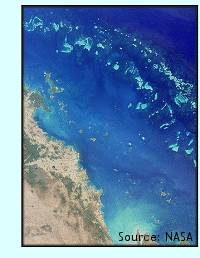
ZNet Commentary March 01, 2007
http://www.zmag.org/sustainers/content/2007-03/01pilger.cfm
In June this year, 26,000 US and Australian troops will take part in bombarding the ancient fragile landscape of Australia. They will storm the Great Barrier Reef, gun down "terrorists" and fire laser-guided missiles at some of the most pristine wilderness on earth. Stealth, B-1 and B-52 bombers (the latter alone each carry 30 tonnes of bombs) will finish the job, along with a naval onslaught. Underwater depth charges will explode where endangered species of turtle breed. Nuclear submarines will discharge their high-level sonar, which destroy the hearing of seals and other marine mammals.
| Visible from space (see right), The Great Barrier Reef isn't just one big structure however. It's made up of a few thousand coral reefs which all play a part in supporting the planet's most complex ecosystem - there are countless species of animals and plants, with new ones being discovered each year.To help protect and conserve these species and the Reef itself, the Great Barrier Reef Marine Park Authority was created and plays a crucial role in the future of the Reef, now a World Heritage Area. |
Run via satellite from Australia and Hawaii,
Operation Talisman Sabre 2007 is warfare by remote
control, designed for "pre-emptive" attacks on
other countries. Australians know little about this. The
Australian parliament has not debated it; the media is
not interested. The result of a secret treaty signed by
John Howard's government with the Bush administration in
2004, it includes the establishment of a vast, new
military base in Western Australia, which will bring the
total of known US bases around the world to 738. No
matter the setback in Iraq, the US military empire and
its ambitions are growing.
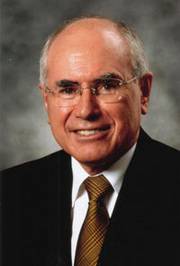 Australia is
important because of a remarkable degree of servility
that Howard has taken beyond even that of Tony Blair.
Once described in the Sydney Bulletin as Bush's
"deputy sheriff", Howard did not demur when
Bush, on hearing this, promoted him to "sheriff for
south-east Asia". With Washington's approval, he has
sent Australian troops and federal police to intervene in
the Pacific island nations; in 2006, he effected
"regime change" in East Timor, whose prime
minister, Mari Alkatiri, had the nerve to demand a proper
share of his country's oil and gas resources. Indonesia's
repression in West Papua, where American mining interests
are described as "a great prize", is endorsed
by Howard.
Australia is
important because of a remarkable degree of servility
that Howard has taken beyond even that of Tony Blair.
Once described in the Sydney Bulletin as Bush's
"deputy sheriff", Howard did not demur when
Bush, on hearing this, promoted him to "sheriff for
south-east Asia". With Washington's approval, he has
sent Australian troops and federal police to intervene in
the Pacific island nations; in 2006, he effected
"regime change" in East Timor, whose prime
minister, Mari Alkatiri, had the nerve to demand a proper
share of his country's oil and gas resources. Indonesia's
repression in West Papua, where American mining interests
are described as "a great prize", is endorsed
by Howard.
This sub-imperial role has a history. When the six
Australian states federated as a nation in 1901, "a
Commonwealth . . . independent and proud", said the
headlines, the Australian colonists made clear that
independence was the last thing they wanted. They wanted
Mother England to be more protective of her most distant
colony which, they pleaded, was threatened by a host of
demons, not least the "Asiatic hordes" who
would fall down on them as if by the force of gravity.
"The whole performance," wrote the historian
Manning Clark, "stank in the nostrils. Australians
had once again grovelled before the English. There were
Fatman politicians who hungered for a foreign title just
as their wives hungered after a smile of recognition from
the Governor-General's wife, who was said to be a most
accomplished snubber."
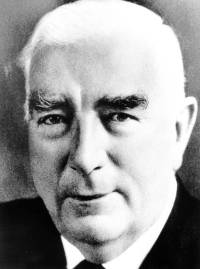 Australia's modern
political class has the same hunger for the recognition
of great power. In the 1950s, prime minister Robert
Menzies allowed Britain to explode nuclear bombs in
Australia, sending clouds of radioactive material across
populated areas. Australians were told only the good news
of being chosen for this privilege. A Royal Air Force
officer was threatened with prosecution after he revealed
that 400 to 500 Aborigines were in the target zones.
"Occasionally we would bring them in for
decontamination," he said. "Other times, we
just shooed them off like rabbits." Blindness and
unexplained deaths followed. After 17 years in power,
Menzies was knighted by the Queen and made Lord Warden of
the Cinque Ports.
Australia's modern
political class has the same hunger for the recognition
of great power. In the 1950s, prime minister Robert
Menzies allowed Britain to explode nuclear bombs in
Australia, sending clouds of radioactive material across
populated areas. Australians were told only the good news
of being chosen for this privilege. A Royal Air Force
officer was threatened with prosecution after he revealed
that 400 to 500 Aborigines were in the target zones.
"Occasionally we would bring them in for
decontamination," he said. "Other times, we
just shooed them off like rabbits." Blindness and
unexplained deaths followed. After 17 years in power,
Menzies was knighted by the Queen and made Lord Warden of
the Cinque Ports.
An undeclared maxim of Australian politics is that
prime ministers become "statesmen" only when
they serve imperial interests. (Honourable exceptions
have been dealt with by smear and subversion). In the
1960s, Menzies connived to be "asked" to send
Australian troops to fight for the Americans in Vietnam.
Red China was coming, he said. Howard is more extreme; in
his decade of power, he has eroded the very basis of
Australia's social democratic institutions and cast his
country as the model of a Washington-style democracy,
where the only popular participation is that of voting
every few years for two "opposing" parties
which share almost identical economic, foreign and
"cultural" policies.
www.nicholsoncartoons.com.au.
For "cultural", read race, which has
always been important in creating an insidious state of
fear and compliance. In 2001, Howard was re-elected after
manipulating the "children overboard affair",
in which his senior advisers claimed that Afghan refugees
had callously thrown their children into the sea in order
to be rescued by an Australian naval vessel. They
produced photographs that were proven false, but only
after Howard had touched every xenophobic nerve in the
white electorate and was duly re-elected. The two
officials who brought the "crisis" to its
fraudulent fever pitch were promoted after one of them
admitted that the deception had "helped" the
prime minister. In a more scandalous case, Howard claimed
his defence department had been unaware of another
leaking, stricken boat filled with Iraqi and Afghan
refugees heading for Australia until after it had sunk.
An admiral later revealed this, too, was false; 353
people were allowed to drown, including 146 children.
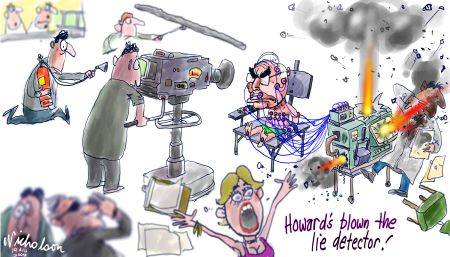
www.nicholsoncartoons.com.au.
Above all, it is the control of dissent that has
changed Australia. Rupert Murdoch's influence has been
critical, far more so than in Britain. Whenever Howard or
one of his more oafish ministers want to bend an
institution or smear an opponent, they carry out the task
in alliance with a pack of rabid mostly Murdoch
commentators. As Stuart MacIntyre describes in a new
book, Silencing Dissent, the Melbourne Herald-Sun
columnist, Andrew Bolt, conducted a campaign of ridicule
against the independent Australian Research Council
which, he claimed, had fallen into the hands of a "a
club of scratch-my-back-leftists" whose work was
"hostile to our culture, history and
institutions", as well as "peek-in-your-pants
researchers fixated on gender and race". The then
minister of education, Brendan Nelson, vetoed one project
grant after another without explanation.
The National Museum of Australia, the national
child benefits centre, Aboriginal policy bodies and other
independent institutions have been subjected to similar
intimidation. A friend who holds a senior university post
told me: "You dare not speak out. You dare not
oppose the government or 'the big end of town' [corporate
Australia]." As embarrassing corporate crime rises,
the treasurer, Peter Costello, has blithely announced a
ban on moral or ethical boycotts of certain products.
There was no debate; the media was simply told. One of
Costello's senior advisers, David Gazard, recently
distinguished an American-run seminar in Melbourne,
organised by the Public Relations Institute of Australia,
at which those paying A$595 were taught the tricks of
conflating activism with 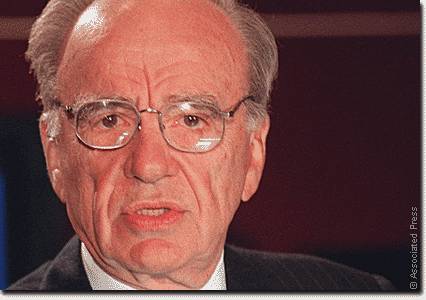 "terrorism"
and "security threat". Suggestions included:
"Call them suicide bombers . . . make them all look
like terrorists . . . tree-hugging, dope-smoking, bloody
university graduate, anti-progress . . ." They were
advised on how to set up bogus community groups and
falsify statistics.
"terrorism"
and "security threat". Suggestions included:
"Call them suicide bombers . . . make them all look
like terrorists . . . tree-hugging, dope-smoking, bloody
university graduate, anti-progress . . ." They were
advised on how to set up bogus community groups and
falsify statistics.
Schoolteachers who do not fly the flag or music
concert organisers who discourage the attendance of
racist thugs wrapped in the flag are at risk of a dose of
Murdoch poison. Equally, if you reveal the shame of
Australia's vassal role you are deemed
"anti-Australian" and, without irony,
"anti-American". Few Australians are aware that
Murdoch, who dominates the press, abandoned his own
Australian citizenship so that he could set up the Fox TV
network in the US. The University of Sydney is to open a
United States Study Centre, backed by Murdoch after he
complained about the inability of Australians to
appreciate the benefits of the bloodbath in Iraq.
Having recently spoken at overflowing public
meetings in Brisbane, Sydney and Melbourne, I am left in
no doubt that many are deeply worried that freedoms in
their sunny idyll are slipping away. They were given a
vivid reminder of this the other day when Vice President
Dick Cheney came to Sydney to "thank" Howard
for his support. The New South Wales state government
rushed through a law that allowed Cheney's 70 secret
service guards to carry live weapons.
With the police, they took over the centre of
Sydney and closed the Harbour Bridge and much of the
historic Rocks area. Seventeen-vehicle motorcades swept
theatrically here and there, as if Howard was boasting to
Cheney: "Look at my control over this society; look
at my compliant country." And yet his guest and
mentor is a man who, having refused to fight in Vietnam,
has brought back torture and lied incessantly about Iraq,
who has made millions in stock options as his Halliburton
company profits from the carnage and who has vetoed peace
with Iran. Almost every speech he gives includes a
threat.
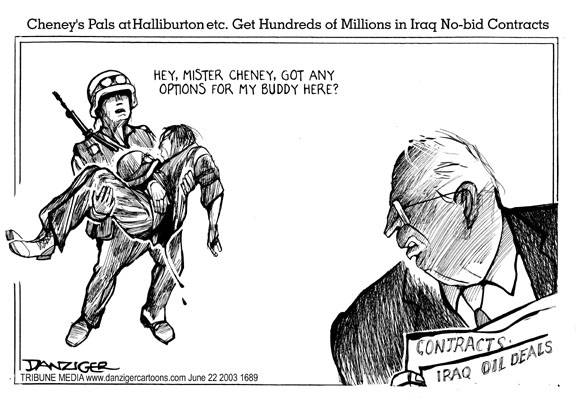
By any measure of international law, Cheney is a major
war criminal, yet it was left to a small, brave group of
protesters to uphold the Aussie myth of principled
rebellion and stand up to the police. The opposition
Labor Party leader, Kevin Rudd, the embodiment of
compliance, called them "violent ferals"; one
of the protesters was 70 years old. The next day, the
headline in the Sydney Morning Herald read:
"Terrorists have ambitions of empire, says
Cheney." The irony was exquisite, if lost.
John Pilger's bestselling history of Australia,
"A Secret Country", is available through www.johnpilger.com
http://www.zmag.org/sustainers/content/2007-03/01pilger.cfm